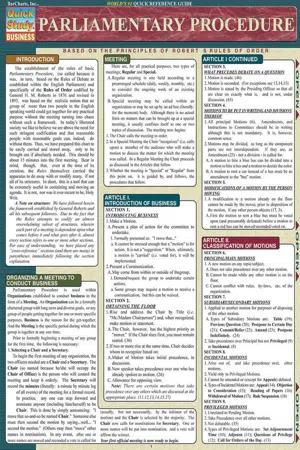
eBook - ePub
Parliamentary Procedure
This is a test
Condividi libro
- 44 pagine
- English
- ePUB (disponibile sull'app)
- Disponibile su iOS e Android
eBook - ePub
Parliamentary Procedure
Dettagli del libro
Anteprima del libro
Indice dei contenuti
Citazioni
Informazioni sul libro
This guide outlines the basic concepts and principles of parliamentary procedures.
Domande frequenti
Come faccio ad annullare l'abbonamento?
È semplicissimo: basta accedere alla sezione Account nelle Impostazioni e cliccare su "Annulla abbonamento". Dopo la cancellazione, l'abbonamento rimarrà attivo per il periodo rimanente già pagato. Per maggiori informazioni, clicca qui
È possibile scaricare libri? Se sì, come?
Al momento è possibile scaricare tramite l'app tutti i nostri libri ePub mobile-friendly. Anche la maggior parte dei nostri PDF è scaricabile e stiamo lavorando per rendere disponibile quanto prima il download di tutti gli altri file. Per maggiori informazioni, clicca qui
Che differenza c'è tra i piani?
Entrambi i piani ti danno accesso illimitato alla libreria e a tutte le funzionalità di Perlego. Le uniche differenze sono il prezzo e il periodo di abbonamento: con il piano annuale risparmierai circa il 30% rispetto a 12 rate con quello mensile.
Cos'è Perlego?
Perlego è un servizio di abbonamento a testi accademici, che ti permette di accedere a un'intera libreria online a un prezzo inferiore rispetto a quello che pagheresti per acquistare un singolo libro al mese. Con oltre 1 milione di testi suddivisi in più di 1.000 categorie, troverai sicuramente ciò che fa per te! Per maggiori informazioni, clicca qui.
Perlego supporta la sintesi vocale?
Cerca l'icona Sintesi vocale nel prossimo libro che leggerai per verificare se è possibile riprodurre l'audio. Questo strumento permette di leggere il testo a voce alta, evidenziandolo man mano che la lettura procede. Puoi aumentare o diminuire la velocità della sintesi vocale, oppure sospendere la riproduzione. Per maggiori informazioni, clicca qui.
Parliamentary Procedure è disponibile online in formato PDF/ePub?
Sì, puoi accedere a Parliamentary Procedure di in formato PDF e/o ePub, così come ad altri libri molto apprezzati nelle sezioni relative a Business e Business General. Scopri oltre 1 milione di libri disponibili nel nostro catalogo.
Informazioni
Argomento
BusinessCategoria
Business General
Article III.Motions And Order Of Precedence
PRIVILEGED MOTIONS
SECTION 10.
SETTING ADJOURNMENT TIME
- Takes precedence over all other motions.
- Not Debatable when made while another motion is on the floor.
- Debatable when presented as a Principal Motion with no other motion on the floor.
- Should, but is not required to, be made with a provision for next meeting time.
SECTION 11.
MOTION TO ADJOURN
- Non-Debatable.
- Takes precedence over all other motions except (10) above.
- Cannot be made while someone else has the floor.
- Can be made after a vote has been taken but before results are announced.
- Can be for a "short term" adjournment used as a recess during long sessions.
SECTION 12.
QUESTIONS OF PRIVILEGE
- Take precedence over all other questions except those above.
- Not to be confused with Privileged Motions as a whole.
- Usually pertain to immediate needs extraneous to business on the floor such as questions of comfort (Turn on/off heat; Open/close windows; Eject rowdy observers; etc.).
SECTION 13.
ORDERS OF THE DAY
- Take precedence over all but the above.
- Usually used to get meetings back on track by reminding assembly of that which was scheduled to be discussed when an "out-of-order" motion or discussion has intervened.
- Can be over-ridden by a majority in circumstances where the motion before the assembly is felt to take precedence over the orders.
INCIDENTAL MOTIONS
SECTION 14.
MOTION TO APPEAL (QUESTIONS OF ORDER)
- Raises questions concerning some point of order within a motion.
- Takes precedence over the motion to which it refers.
- Must be decided by Presiding Officer without debate.
- Appeal can only be made at time of decision by Chair.
SECTION 15.
OBJECTIONS TO QUESTION CONSIDERATION
- Can only be made when Question is first introduced.
- Cannot be debated (35) or amended. (23)
- Purpose is to curtail unproductive or irrelevant questions.
- It is not used to close debate of relevant issues.
- Purpose is to curtail unproductive or irrelevant questions.
SECTION 16.
READING PAPERS
- A one-time reading of relevant papers may be requested purely for informational purposes.
- It cannot be used as a delaying technique to postpone vote.
SECTION 17.
WITHDRAWAL OF A MOTION
- If moved by the maker of the motion, is granted without debate unless such is called for.
SECTION 18.
SUSPENSION OF THE RULES
- Applies only to Standing Rules or Rules of Order.
- Cannot be amended or debated.
- Can only be used once in a meeting, but can be reintroduced in a subsequent meeting even if same should occur within the same day.
SUBSIDIARY MOTIONS
SECTION 19.
MOTION TO TABLE
- Temporarily postpones further action on a motion.
- Takes Precedence over other Subsidiary Motions. (7)
- Does not take precedence over Incidental (8) or Privileged (9) Motions.
SECTION 20.
MOVING THE PREVIOUS QUESTION
- Ends debate and calls for a vote on the pending motion.
- Cannot be amended or have subsidiary motion (7) added.
- Can be applied to Questions of Privilege (12) or other debatable motion.
- If approved then the Main question, as well as all Subsidiary Questions and Amendments on the floor, are voted upon in reverse order of their proposal.
SECTION 21.
MOVEMENT TO POSTPONE (TO A SPECIFIC TIME)
- Takes precedence over Sections 22-24 below, but yields to all relevant sections above.
- Postpones all aspects of the motion and debate until the stated time.
- If several motions have been postponed and the specific time for discussion has passed, the motions must be considered in the order to which they were postponed (i.e. Motions postponed to, say, Tuesday are discussed before motions postponed to Wednesday even if both Tuesday and Wednesday have passed and the discussion resumes on Thu...